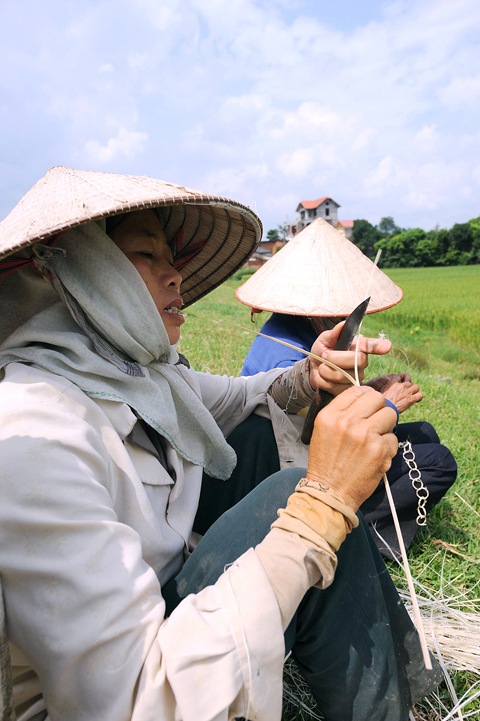Double-digit inflation and shocks from the global financial turmoil threaten to plunge Vietnamese households living on the margins back into dire poverty, the UN has warned.
Despite Vietnam’s economic boom of recent years, many groups remain vulnerable to food shortages — especially landless farmers, the urban poor and ethnic minority groups — UN resident coordinator John Hendra said.
While global commodity and energy prices have dropped back from their peaks this year, Vietnam’s inflation, although falling, still stood at 26.7 percent this month, squeezing the family budgets of the most marginalized groups.

PHOTO: AFP
On top of soaring consumer prices, Hendra said, the global financial crisis will likely impact Vietnam’s export-driven economy.
“Taken together, these economic challenges threaten to derail Vietnam’s progress in reducing poverty,” he said in a televised national address on Friday.
UN data showed that “less money is available to many Vietnamese households, especially poorer ones and there is a real risk some families could fall back below the poverty line, while those already there need additional help,” he said.
“Poorer women and children are particularly at risk since higher food prices can worsen their already precarious nutritional status,” he said.
Vietnam, which launched its doi moi (renewal or renovation) market reforms in the late 1980s, has seen more than a decade of economic growth above 7.5 percent, lifting tens of millions out of poverty.
The developing country of 86 million joined the WTO early last year and hopes to soon become a middle-income nation with annual GDP of US$1,000 per capita.
However, over the past year, Vietnam’s overheating economy has been hit by double-digit inflation and other economic woes. Especially high food and gasoline prices have hit the poor the hardest and fuelled social discontent.
Vietnam, the world’s No. 2 rice exporter, does not face overall food shortages, Hendra stressed in a separate speech last week.
But he warned that, while some farmers had benefited from high global food prices, more than half of Vietnamese households are net buyers of food and have seen their real purchasing power reduced.
Groups including low-skilled and landless rural workers and the elderly “are not only temporarily worse off but also challenged in their long-term ability to secure adequate intakes of food,” Hendra said.
Ethnic minorities faced the greatest risk, including in the Central Highlands and northwestern mountains, which already face “high poverty and moderate to severe stunting rates among children under five years.”
To address the problem, Hendra recommended that Vietnam strengthen its social security programs and its data collection on poverty to more precisely and quickly identify and help the most vulnerable groups.
He also warned of long-term threats to food security in industrializing Vietnam as agricultural areas face pressure from “a growing demand for land for industrial, residential, tourist and leisure purposes.”

The US government has signed defense cooperation agreements with Japan and the Philippines to boost the deterrence capabilities of countries in the first island chain, a report by the National Security Bureau (NSB) showed. The main countries on the first island chain include the two nations and Taiwan. The bureau is to present the report at a meeting of the legislature’s Foreign Affairs and National Defense Committee tomorrow. The US military has deployed Typhon missile systems to Japan’s Yamaguchi Prefecture and Zambales province in the Philippines during their joint military exercises. It has also installed NMESIS anti-ship systems in Japan’s Okinawa

‘WIN-WIN’: The Philippines, and central and eastern European countries are important potential drone cooperation partners, Minister of Foreign Affairs Lin Chia-lung said Minister of Foreign Affairs Lin Chia-lung (林佳龍) in an interview published yesterday confirmed that there are joint ventures between Taiwan and Poland in the drone industry. Lin made the remark in an exclusive interview with the Chinese-language Liberty Times (the Taipei Times’ sister paper). The government-backed Taiwan Excellence Drone International Business Opportunities Alliance and the Polish Chamber of Unmanned Systems on Wednesday last week signed a memorandum of understanding in Poland to develop a “non-China” supply chain for drones and work together on key technologies. Asked if Taiwan prioritized Poland among central and eastern European countries in drone collaboration, Lin

ON ALERT: Taiwan’s partners would issue warnings if China attempted to use Interpol to target Taiwanese, and the global body has mechanisms to prevent it, an official said China has stationed two to four people specializing in Taiwan affairs at its embassies in several democratic countries to monitor and harass Taiwanese, actions that the host nations would not tolerate, National Security Bureau (NSB) Director-General Tsai Ming-yen (蔡明彥) said yesterday. Tsai made the comments at a meeting of the legislature’s Foreign Affairs and National Defense Committee, which asked him and Minister of National Defense Wellington Koo (顧立雄) to report on potential conflicts in the Taiwan Strait and military preparedness. Democratic Progressive Party (DPP) Legislator Michelle Lin (林楚茵) expressed concern that Beijing has posted personnel from China’s Taiwan Affairs Office to its

BACK TO WORK? Prosecutors said they are considering filing an appeal, while the Hsinchu City Government said it has applied for Ann Kao’s reinstatement as mayor The High Court yesterday found suspended Hsinchu mayor Ann Kao (高虹安) not guilty of embezzling assistant fees, reducing her sentence to six months in prison commutable to a fine from seven years and four months. The verdict acquitted Kao of the corruption charge, but found her guilty of causing a public official to commit document forgery. The High Prosecutors’ Office said it is reviewing the ruling and considering whether to file an appeal. The Taipei District Court in July last year sentenced Kao to seven years and four months in prison, along with a four-year deprivation of civil rights, for contravening the Anti-Corruption